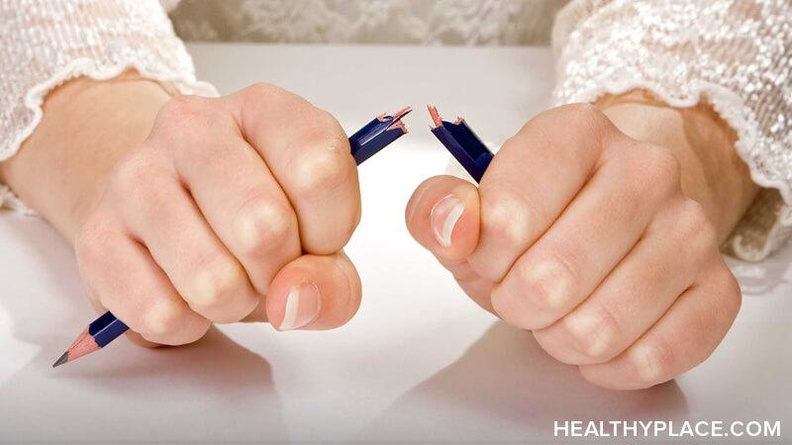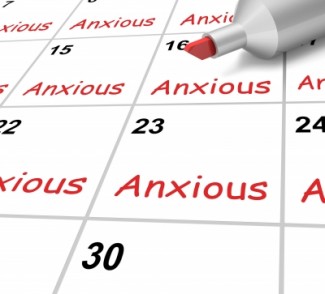Early Sobriety Will Trigger Anxiety

I've been reading the Debunking Addiction blog lately, and it's gotten me thinking about how my early sobriety triggered my anxiety. Early sobriety generally refers to the first year of not drinking after sobering up. My experience has been that early sobriety will trigger anxiety, especially if you already have an anxiety disorder, which I believe many problem drinkers do (Addiction and Mental Illness: The Struggle to Stay Sober and Sane).
Why Early Sobriety Triggers Anxiety
Even though I've been sober for a while now, I clearly remember the pain of early sobriety. That first year of not drinking was pretty much hell. I was struggling to not drink, going to as many Alcoholics Anonymous (AA) meetings as I could, and trying to keep my generalized anxiety disorder symptoms from completely taking over my life.
Over the years, drinking developed into my main coping skill to deal with my painful emotions, especially anxiety. But, when I had to stop drinking, I found out the hard way that I'd coped with anxiety merely by suppressing it with alcohol. And now the alcohol (and the suppressive relief it brought) was gone. My anxiety flared like a raging brush fire. It was time to find new methods for living with anxiety.
What to Do When Early Sobriety Triggers Your Anxiety
 Getting sober is essentially about avoiding negative coping skills and learning constructive ones. This is especially true in early sobriety when anxiety triggers flare up due to lack of alcohol. Plus the overall strangeness of navigating the world sober would cause anyone extra anxiety and stress. It feels weird for a while.
Getting sober is essentially about avoiding negative coping skills and learning constructive ones. This is especially true in early sobriety when anxiety triggers flare up due to lack of alcohol. Plus the overall strangeness of navigating the world sober would cause anyone extra anxiety and stress. It feels weird for a while.
Here are some things you can do in early sobriety to reduce your anxiety triggers:
- Go to lots of 12 Step meetings. -- If you're getting sober via a 12 Step program like AA, it's a good idea to go to a lot of meetings in early sobriety. Lots of people in the program told me early on that I should try to go to a meeting a day for awhile.
- Find meetings that work for you. -- Every meeting has a different flavor and tone, so find ones you feel comfortable enough in to share honestly about how you're feeling. The whole point of meetings is to talk honestly about your experience. It's a little like group therapy, but without the high counseling fees (see What is Group Therapy? How It Works, Why It’s Useful).
- Get a 12 Step sponsor. -- A sponsor is a fellow addict/alcoholic who acts as a confidant and a guide through the 12 Steps. A good sponsor is someone you can trust and are willing to risk revealing yourself to. Don't overlook the importance of a sponsorship in addiction recovery. Look for someone of the same sex who you relate to, or who's sobriety intrigues you in some way. A lot of good sponsors have also struggled with mental health issues, and have overcome them to some degree through their perseverance in sobriety.
- Work the 12 Steps. -- The steps, plus a belief in a higher power concept of your understanding, are two of the main tools in 12 Step recovery. They help you get at and work through painful feelings like anxiety during early sobriety. The Steps are spiritual tools that can help you better relate to (and regulate) your emotions without the use of drugs or alcohol.
Many alcoholics and addicts in early sobriety experience anxiety triggers. Even people without serious anxiety issues often feel a lot of anxiety during their first year. In my opinion, it's pretty much inevitable that early sobriety will trigger anxiety.
The tools of recovery, like meetings, the Steps, and a sponsor, are substitute coping skills for drinking. They don't work as fast, and they're not as easy to acquire, but, over time, they're much more constructive and work better than drinking ever could.
You can find Greg on his website, Twitter, Google+, Pinterest, and Facebook.
Anxious calendar image courtesy of Stuart Miles at FreeDigitalPhotos.net
APA Reference
Weber, G.
(2015, October 29). Early Sobriety Will Trigger Anxiety, HealthyPlace. Retrieved
on 2026, March 3 from https://www.healthyplace.com/blogs/treatinganxiety/2015/10/early-sobriety-will-trigger-anxiety
Author: Greg Weber
Tomorrow is day 30 for me on my 4th attempt to eliminate alcohol from my life. I’m going through the highs and lows now but don’t want to go backwards. I’m a binge drinker who loses control after a certain point and the days to follow are worse with guilt and anxiety. I hate the power alcohol has over me that can change my mind in a matter of seconds.
Beer drinking was my daily medicine for anxiety and depression too. But after 30 years it does catch up to you and actually increase anxiety and depression. Good luck on your recovery. Better days are ahead.